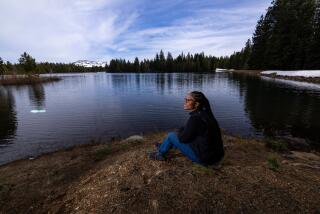‘Ecotopia’ Greener by $85 Million : Wealthy sisters endow a foundation to protect Puget Sound area. It is run by a well-known environmentalist.
SEATTLE — Some things we expect in a Northwest environmentalist--the de rigueur flannel-and-wool garb of the urban outdoorsman, that earnest eco-blend of pessimism and optimism and of course a fond ear for wind in the distant pines.
Denis Hayes has that, and something else environmentalists are otherwise known to lack--an $85-million war chest to try to protect this corner of the world.
Three years ago, one of Seattle’s best known silk-stocking families astounded the city it helped shape. Sisters Priscilla (Patsy) Bullitt Collins and Harriet Stimson Bullitt, heirs to the Bullitt fortune, said they were selling off the family’s pioneering King Broadcasting television business and devoting their lives to the crusade of the greens.
Employees of KING TV, the NBC affiliate station, wept at learning they were just another property to be auctioned off; and the city that had made the Bullitts rich beyond dreams arched an eyebrow at the, well, antics of these venerable sisters.
But just as two previous generations of founding Bullitts helped develop Puget Sound, the sisters said it was their vision now to try to preserve it.
They endowed their Bullitt Foundation to a total of $85 million, an amount that is expected to grow even larger from their estates. And to run it, they hired Hayes, organizer of the original Earth Day in 1970, solar energy czar in the Jimmy Carter Administration, college engineering professor and all-around varsity player in the save-the-world leagues.
With not quite one year on the job, Hayes already dispenses as much cash from the Bullitt Foundation as Northwest environmental causes receive from all other sources combined.
But Hayes, 48, wants more than a study here or a green lawsuit there.
The hardheaded dreamer intends to chart the energy future of this fast-growing but tradition-bound region.
Here is the situation: The modern Northwest is the product of a cheap energy boom, thanks to the vast assemblage of hydroelectric dams erected on the Columbia River over the last half-century. Electricity is typically one-third cheaper than the national average.
But there is no more space for dams. And the cherished symbol of Northwest environmental vitality, the salmon, are dying off because of the dams already in place and their unnatural effect on the river. Meanwhile, Oregon recently shut down a major nuclear power plant in the region, and British Columbia is soon going to reduce its export of electricity to the Northwest. At the same time, growth continues unabated.
No wonder that politicians and specialty government agencies like the Northwest Power Planning Council have exhausted themselves trying to map a future.
Hayes, of no mind to dally, says the Bullitt Foundation will come forth with the outline of an environmentalist alternative plan this summer. He promises its ideas will show “how we could lead the world in renewable energy resources.”
Naturally, the foundation will also pick and choose between rival interests, powerful interests.
“Energy is not a neutral game; there are going to be big winners and big losers,” Hayes says.
Even the tone behind such a proposal would be something new for the Northwest, which by modern tradition prefers accommodation and compromise over confrontation. When residents call this place “Ecotopia,” they refer to its gentility as well as to its clean air and sensational vistas.
A foundation can hope only to arouse the public enough to force action. Hayes says the Bullitt Foundation will present its plan to the Northwest, asking citizens, “Is this the future you want? If so, here is what has to be done.”
Two sisters are banking a fortune and the good name of a pioneer family on the answers.


